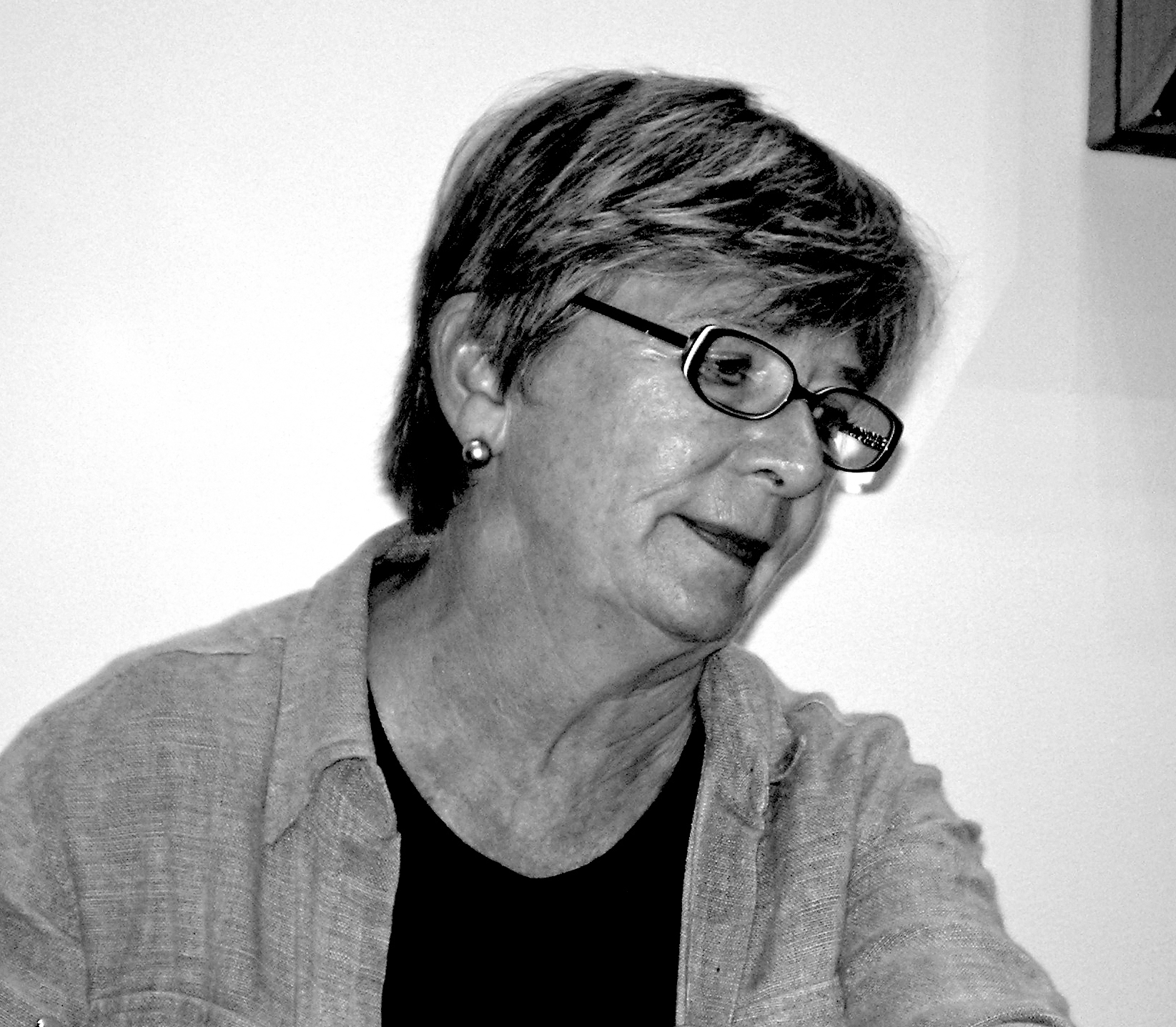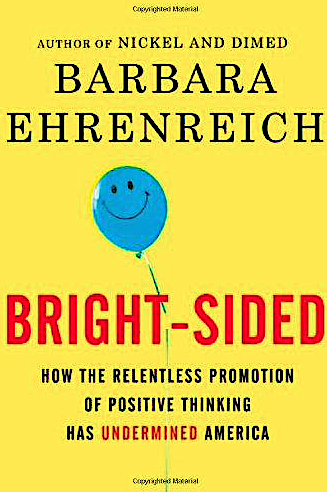The late author Barbara Ehrenreich laid bare the industry of positive thinking in her book Bright Sided, writes

Barbara Ehrenreich in 2006. (David Shankbone, CC BY 2.5, Wikimedia Commons)
By Sonali Kolhatkar
OtherWords
 The late Barbara Ehrenreich was best known for her 2001 bestseller Nickel and Dimed, which showed that hard-working people simply weren’t making it in America.
The late Barbara Ehrenreich was best known for her 2001 bestseller Nickel and Dimed, which showed that hard-working people simply weren’t making it in America.
But Ehrenreich, who passed away this month at 81, made an equally great contribution to economic justice with her subsequent book, Bright-Sided. It argued that the cult of “positive thinking” was putting a smiley face on inequality and “undermining America.”
Bright-Sided was published in 2009, between the Great Recession and the Occupy Wall Street movement, which called attention to the stark economic split between the wealthiest “1 percent” of Americans and the “99 percent” of everyone else.
I had the honor of interviewing Ehrenreich during this period. She explained that “there is a whole industry in the United States invested in this idea that if you just think positively, if you expect everything to turn out alright, if you’re optimistic and cheerful and upbeat, everything will be alright.”
Ehrenreich, who survived cancer, said she began her investigation into the ideology of positive thinking when she had breast cancer, roughly six years before Bright-Sided was published. That’s when she realized what a uniquely American phenomenon it was to put a positive spin on everything.
 She applied that idea to economic inequality, discovering an entire industry telling struggling Americans that their poverty stemmed from their own negative thinking. It promised they could turn things around if they simply “visualized” wealth, embraced a “can-do” attitude, and willed money to flow into their lives.
She applied that idea to economic inequality, discovering an entire industry telling struggling Americans that their poverty stemmed from their own negative thinking. It promised they could turn things around if they simply “visualized” wealth, embraced a “can-do” attitude, and willed money to flow into their lives.
Central to this industry are “the coaches, the motivational speakers, the inspirational posters to put up on the office walls,” said Ehrenreich — and many megachurches and multi-millionaire “prosperity gospel” preachers, too. “The megachurches are not about Christianity. The megachurches are about how you can prosper because God wants you to be rich,” she said — adding that in many of them, “you won’t even find a cross on the wall.”
But the cult of positive thinking ultimately has more secular roots. “It grew because corporations needed a way to manage downsizing, which really began in the 1980s,” she said. Businesses that laid off masses of employees had a message that “you’re getting eliminated… but it’s really an opportunity for you. It’s a great thing; you’ve got to look at this positively. Don’t complain.”
Eventually, Americans internalized the idea that losing one’s job has got to be a sign that something better is coming along and that “everything happens for a reason.” The alternative is to blame one’s employer, or even the design of the U.S. economy. And that would be dangerous to Wall Street and corporate America.”
Another purpose of fostering positive thinking among those who are laid off, according to Ehrenreich, is “to extract more work from those who survive layoffs.” After all, those who remain employed ought to feel lucky to have a job — even if it means working late hours, working on the weekends, and taking on exhaustive responsibilities. More positive thinking.
We owe Ehrenreich a debt of gratitude for shining a light not only on the perversity of the U.S. economic system, but also on the gauzy veil of positive thinking that obscures it. Sometimes, positive change needs to begin with some not-so-positive thinking.
Ehrenreich may not have lived to see her ideas of economic justice fully realized. But, as she once told the New Yorker, “The idea is not that we will win in our own lifetimes … but that we will die trying.”
Sonali Kolhatkar is the host of “Rising Up With Sonali,” a television and radio show on Free Speech TV and Pacifica stations. This commentary was produced by the Economy for All project at the Independent Media Institute and adapted by OtherWords.org.
This article is from OtherWords.
The views expressed are solely those of the author and may or may not reflect those of Consortium News.
Donate Today to CN’s
2022 Fall Fund Drive
Donate securely by credit card or check by clicking the red button:

How about the Positives and Power in Negative Thinking?
If “protesting” can be considered positive thinking then maybe.
But this article exposes the silly side, even damaging side of “don’t worry, be happy”.
Another good one Consortium.
I have put off reading Ehrenreich for too long. I think I will start with this one. This essay certainly rings true for the smiley face era in the US of Amnesia, where if one is not successful and rich, then there is something wrong with you. Our proxy war in Ukraine is only enabled because so many of our fellow citizens are anesthesized to the reality that the American dream is really a nightmare; it always has been for other nations, now the predatory nature of capitalism is increasingly apparent here for those willing to look. Unfortunately, that takes more courage than most Americans have, bunkered down and hoping against hope. Because ‘freedom’. Because markets. “Don’t worry, be happy.”
I made this observation 20+ years ago. Back when there used to be book stores, (those along with libraries were my haven in a crazy world) The “Self Help” section was eventually moved right up front and had the most browsers in it. I couldn’t get in my brother in law car without having to stack aside dozens of “Self Help” tapes he played constantly as he drove, telling him how great he is and how much he deserved being rich and having everything the world had to offer.
This trend made me sick to my stomach.
The “self-help” era had its good points, one of which helped victims of childhood trauma get past it, or at least realize the damage it did. I have zero aspirations of acquiring monetary wealth, but I did learn that being called “stupid” all my life by my dad stemmed from the abuse he suffered from his dad, and his dad, etc. I was able to stop the cycle of abuse with my own children because of that era.
But I do agree that those “You can be rich too!” lines of BS helped exacerbate the capitalist goal of filling damaged hearts and souls with stuff, stuff, and more stuff. Nothing can fill the void Americans are indoctrinated to have from not being “rich” enough. It’s ironic that those wealthy “Christian” speakers forgot the most important rule in their sacred book – “The love of money is the root of all kinds of evil.” I can’t imagine Jesus flying around in a private jet while millions of little children starve to death all over His daddy’s “creation.”
Check out the new “Jim Bakker Show.” They sell apocalypse gear for when the rapture comes. Varying donations net stuff like “Banquet in a Bucket,” (freeze-dried meals), water filters, and solar generators. Prepping for the end times is BIG business! He also started “Trump’s Evangelical Army of God.” LOL! It’s a SNL skit verbatim. As if Jesus, known as the Lord of Love and Prince of Peace would chose the lying, cheating, POS war-criminal-from-hell to represent Him in any way!
And, interestingly, a women’s magazine had an article many years ago about positive thinking and the idea that what you think will bring the same to you. All the people they interviewed said that idea goes completely against all we know, that positive actually attracts negative and vice versa!
Unfortunately the US version of success is to ensure you do NOT blame yourself or your leaders for any strife in the world, but spread the blame to all the many “enemies” you have decided are not democratic enough to follow our rules.!!!
Arbeit macht frei. ‘We will own nothing and be happy’.
When I apply “Positive” to my neighbours first, when I want the best for my neighbours, then havre I transcended self and promoted “positive change” in the world …
The “positive thinking” ideology preceded the 1980’s – it’s a facet of what BBC journalist Adam Curtis explores in his superb 4 part documentary “The Century Of The Self”
hxxps://www.youtube.com/watch?v=DnPmg0R1M04
Thank you for sharing this
A good story but the article is too short for so vast a subject. But the reporter should be commended for engaging something so endemic to American and Western society that we may have lost sight of it. Unfortunately history’s real positive thinkers were somewhat insane, recklessly following their “star.” Cases: Napoleon, Lenin, etc.
‘The admonition to be happy, voiced in concern by the scientifically epicurean sanitarium director, and the highly-strung propaganda chiefs of the entertainment industry, have about them the fury of the father berating his children for not rushing joyously downstairs when he comes home irritable from his office. It is part of the mechanism of domination to forbid recognition of the suffering it produces, and there is a straight line of development between the gospel of happiness and the construction of camps of extermination so far off in Poland that each of our countrymen can convince himself he cannot hear the screams of pain. That is the model of unhampered happiness.’ – Theodor Adorno, Minima Moralia
It is also about denial and suppression of actual feeling and thought, in favour of artificially constructed behaviour and belief.
Such constructs are not sustainable, and are visible as false by many people who can sense, consciously or unconsciously, the difference between genuine and false behaviour. As such, it is dishonest behaviour.
Appropriate quote, Nick.
Wow!